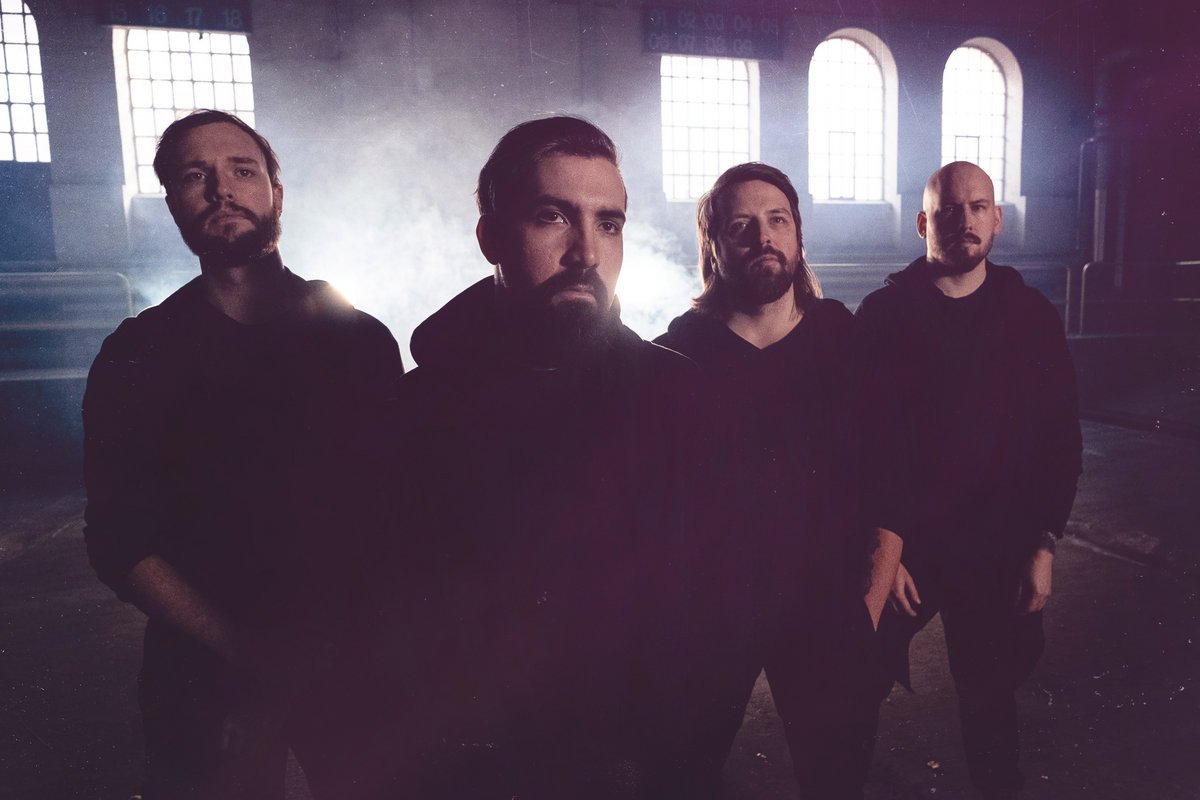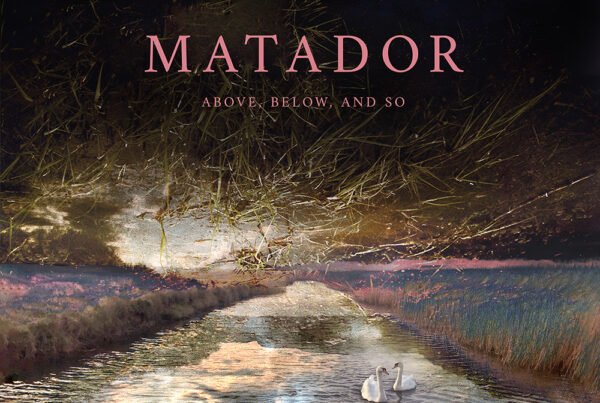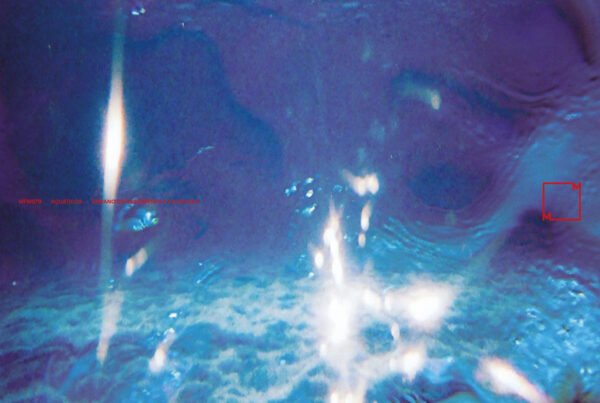The Sleeping City is living proof that new music from An Abstract Illusion is no longer an illusion but rather a tangible reality.
Release date: October 17, 2025 | Willowtip Records | Facebook | Instagram | Bandcamp | Purchase/Stream
In the unforgiving tundra of progressive death metal, An Abstract Illusion’s The Sleeping City emerges as a colossus, hewn from the frozen marrow of innovation and ambition. Following the seismic impact of Woe a mere three years prior, this latest offering arrives with the ferocity of a winter gale, its synth-laden expanse reshaping the genre’s horizon. The Sleeping City strikes with relentless precision and oppressive beauty, weaving intricate layers of frostbitten keyboards and raw, primal aggression. Trading Woe’s classical elegance for a jagged, retro-futuristic edge, The Sleeping City is a towering edifice of sound, its maximalist spirit defying the barren minimalism of the modern age. Join us today, as we venture into its icy depths, dissecting a record that roars with the untamed heart of a wilderness unbound.
Rob: Hey JP, how’s it going? It’s been a hot minute since we’ve done one of these, eh? Though it is fitting we reunite for another prog death record.
JP: Yo Rob! It really has been a while, I don’t even remember what was the last album that we covered together. Knowing us though, it was probably some prog record, so yes, An Abstract Illusion is fitting indeed! Feels crazy that it hasn’t been that long since Woe and we’re already getting a new record. I thought we’d have to wait another 6-7 years again for the next release.
R: Honestly, that’s exactly what I was thinking as well. When Woe dropped, I was astonished with it in so many ways, though for me it hasn’t been that long of a wait as I only discovered the band around 2019. Still, it is rather surprising that a follow up came in so soon and so hot!
JP: For sure. It was the long wait from one album to the next that made Woe feel so much sweeter. Like the band was “almost gone”, not really, but the eventual release of that album was the only reassurance that new music from them would even exist. Now they’re steadily releasing music and that is comforting in a similar but different way now. We don’t have to worry about them not putting out music anymore, not including things that spontaneously come up in life, as they do of course.
R: I can definitely get behind that thought. I mention that it is surprising, because, if you look at Illuminate the Path and then at Woe – the distance between them in terms of time and musical progress (for the lack of a better phrasing) seems proportional. They made a monumental album in that 6 year span. I find it even more impressive that they managed to deliver something that is arguably better, even if not by a large metric, than Woe, in these 3 years. I think I’m on my 20-something-th listen of The Sleeping City and I somehow keep uncovering new things and perspectives. I wasn’t even entirely sure I fully digested and dissected Woe to be perfectly fair, hahaha!
JP: I feel that, an album like Woe still needs time to digest in the back of my mind, with how monumental it was. Now with The Sleeping City, I have to process both. It is definitely a great feeling to have this band “back”, not that they were ever truly gone or anything. Their consistent presence and releasing of stellar music adds to the pool of those niche melodic prog death bands that don’t release music that often (ala Persefone, Ne Obliviscaris, Kardashev, and Disillusion just to name a few off the top of my head). The release of new music from these artists feels staggered so that there is always something massive to sink our teeth into so we’re not desperately waiting for whatever the next record is, making it far easier to be patient indeed. But yes, let’s talk The Sleeping City!
R: Absolutely and it definitely makes playing the waiting game for the new album much, much easier. Through my first thoughts entering this discussion was the one where I’m thinking that I probably need to listen to the album approximately another 275 more times until I feel like I really, fully internalized it. One of its standout features is that It is raucously dense. It’s pretty much at the upper limit of what I will find extremely dense but still manage to fully enjoy. Any denser than this and it would’ve been overkill. It’s impressive how much they managed to cram into one hour of runtime without having it become an unintelligible mess.
JP: Hmmmm, to me, it doesn’t feel any more dense or compositionally different than their previous works. I do agree that their music as a whole is in fact dense and simultaneously concise, making for a masterful balance from a listener’s perspective. You know that meme with the three dragon or hydra heads that are either all super intimidating or the first two are intimidating and the last one is a derp face? An Abstract Illusion’s discography is the version with the three chad hydras, The Sleeping City included obviously. Anyways, what immediately strikes me as different about this album is the aesthetic more so than anything else. Woe went from historical, classical tinged prog death with gorgeous piano interludes and breaks, to this frosty synth-heavy beast that feels like it came out of the 80’s, without any of the cheese.
R: Hahaha!! Yeah, I can definitely see that meme as an appropriate comparison. I was struggling to put into words how exactly The Sleeping City is different from Woe and you put it very well. It’s mostly an aesthetic thing. Woe as you say is in a more classical, standardized sense a progressive death metal record, with a diverse cast of moods, instruments, pacing, and level of texturing. While The Sleeping City just dialed in everything up to 11 and ran with it. I like how you framed it though – ‘frosty synth-heavy beast from the 80s’. I can absolutely relate to that, but I think the band said it best. On their Bandcamp page, their description states succinctly “Atmospheric hymns from the tundra”.
I think they released something that lives up to the apotheotic end of that metaphor and the album’s cover art is essentially the cherry on top of this ineffable frozen cake of sounds. I also feel like somehow, all their albums cascade so neatly into each other. You can listen to them back to back chronologically and it not only makes perfect sense stylistically, but also in terms of structure and narrative. Especially when going from Woe to The Sleeping City. It feels like they were both cut from the same cloth. Part of me wants to say one is better than the other, but it’s really impossible for me to do that. I feel they are equally amazing, but in vastly different ways. They don’t compete. Each is a part of something larger and each has its unique, monolithic charm.
JP: I never noticed that self-proclaimed descriptor on their Bandcamp and whoever came up with it deserves a medal. But yeah, their aesthetic emphasis on synths/electronics here definitely gives that winter-y vibe and I’m all for it. The album artwork even gives that off, and the purple hues give it that additional retro feel. All the instrumental complexity, textures, and dynamics that you mention are still all over this record, but the inclusion of the Woe’s classical piano was substituted out for an electric keyboard that allows for more ‘flexibility’ on the sounds that can be produced, hence all the synths.
To me, the intro track, “Blackmurmur”, epitomizes the entire record in a single song, as it is a textbook An Abstract Illusion composition flaunting their new musical sauce. One of my favorite moments on this track (and album as a whole), is that atmospheric break/bridge that creates this deeply meditative soundscape that I could drown in. While they’re experimenting with this new sound on top of their familiar ‘core’, they embraced it to its fullest potential. The manner in which they incorporate these new sounds and textures amongst their usual repertoire is so effortless and masterfully done.
R: The keyboards/synths literally lift this album from something great to something truly majestic. I think it definitely keeps the immersive character much more pervasive as they essentially flood all the gaps through the entire runtime of The Sleeping City. I have a distinct feeling some might call this excessive, but not me. I am an assumed maximalist and in this forsaken age of post modern minimalism, I’m here, cheering at the top of my lungs for these kinds of artistic decisions – especially when artists lean into them with all their heart and mean it. “Blackmurmur” is an absolutely baller and brave way to start off an album. The band just decided to skip any notion of introductions and laid it on thick with an 11 minute epic. I also agree that it’s an apt epitomization of the musical ethos of both the band and the record. I think it’s ultimately a very detailed, rich, and appropriate way to kick things off. It’s definitely one of my favorite tracks from The Sleeping City.
JP: This band certainly knows how to make a statement, which they definitely did with “Blackmurmur” as we just discussed. I too very much appreciate when artists know their strengths, only to test said strengths by pushing themselves out of their own comfort zone, birthing something new that couldn’t have been conceived otherwise. Beyond the intro track, there are so many brief moments and flourishes in which those electronic effects are sprinkled at just the right time, playing off of the rhythms and melodies already established in a given song. It is all over the place but simultaneously never over- or under-utilized.
My other favorite track on the album is honestly the interlude and penultimate track, “Silverfields”. It is the only short song and yet it leaves the biggest impact on me out of the bunch. I often find myself looping that little synth melody in the back of my head and when I notice that I’ve been doing it subconsciously, I then engage my brain to play the rest of the track in my head if I am not able to actually listen to the music at that moment in time. Although short, it is a beautiful slow burn that goes from chilly yet equally warm soundscapes to an explosive and triumphant hurrah when the full band comes in harmonizing with that same melody from before.
R: Indeed, the ornamentation is supremely lush and most satisfying. I find that especially enjoyable in the way it all dances around the lead guitars or the lead synths/keys. Though I do find it interesting that you are that drawn to “Silverfields”, whereas I’m on the other side wondering why was it not simply incorporated into the closing title track as an expansive manner of leading us into the massive denouement. Though I would like to underline it’s not only the shortest song, but also the only track under 8 minutes. It kind of makes me wonder given the insanely intricate structures present, why even bother splitting the record into songs. Each song feels like 5 songs played at the same time, condensed into kaleidoscopic marvels – never mind how they all flow together neatly. This also made me wonder how do the members manage to remember everything? I mean sure, I’ve heard longer, denser, more complicated things, but somehow the question always appears.
JP: Sounds like you need to get the record on vinyl and exclusively listen to it through that medium with the amount of philosophy you’re getting about individual tracks and whatnot. I do get the point you’re trying to make though with each song being a large enough adventure individually, although it pales in comparison to the adventure that is the entire record, a cohesive collective of musical journeys. As far as wondering how the band composes and memorizes these complex parts and constant changes, I couldn’t tell you either. It’s almost as if their music is an abstract illusion that only they speak and understand the language of, while us plebians can only marvel at its surface level beauty.
R: Amen to all of that mate! Just to wax poetic/philosophical a bit more, another thing I find so profoundly fascinating is that the album itself feels like it mimics nature itself. What I mean is that, say, like a tree – from afar it looks like a single unit – the whole album. As you get closer you see it’s made up of a series of interconnected parts which blend in synergy to create something greater than the sum of its parts. The leaves, the branches, the roots, the bark – each song. As you would zoom further into more microscopic details, you see almost disconnected, individual structures doing their own thing. I’m almost certain the band may have never looked at it like this, but given that they sing essentially about nature and humanity, it’s more than a fitting parallel.
The other thing I wanted to underline is how profoundly evocative the record is. I could never encompass in words where exactly the music sends me, or what it makes me picture, but it’s something outstandingly vivid, breathtaking, and far, far away. It’s more than an adventure, it’s an experience, almost like witnessing a lifetime from a parallel universe condensed into a mere hour, played out at maximum speed while retaining its pacing.
JP: Welp, there it is. The moment in the conversational review in which Rob opens his third eye and eloquently illustrates the sheer emotion that the music is able to draw out of him. Very beautifully put, and yet again, I am left speechless having to somehow follow that up. If you’re reading this An Abstract Illusion, know that your music must truly be special and transcendent (and it is!) if it is able to get Rob of all people on this utterly profound wavelength. Forget having your music go quadruple platinum or winning a Grammy or whatever “prestigious” award that the lay-musician strives for. It is the single greatest privilege as a band/artist to be able to get THE Robert Miklos to rhapsodize about your music as he just did. Well fucking done, go tell your moms.
R: Hahaha! Hilarious, and true to an extent, but also flattering. Returning to a more worldly demeanor, I really enjoyed and will continue to enjoy The Sleeping City for a long while. It’s an amazingly made work of art and it’s also produced extremely well for what it is. I think my only gripe with it, if I can even call it that, is that it doesn’t have more groovy riffs/breakdowns. I think that after binging on it so voraciously, I need to step back before I reach the pitfall of ‘I listened to it so many times on repeat that I hate it now’. Though the temptation is real. Binging is fun, albeit treacherous.
JP: Go back and listen to “Like A Geyser Ever Erupting” (95% sure that’s the right song off the top of my head) and you’ll get your fill of nastiness that you so desire, and then some. Album definitely has plenty, I think you exclusively listening through on the full album format (which is the only way to do it of course) causes it gets buried in the rest of the majesty this album has to offer, plus y’know, you overdoing it. But yes, it’ll always be a treat whenever it is time to circle back to this record after a little bit of separation from it. I try to do that with all of my absolute favorite albums and it only makes them feel all the more special than they already are, as I am sure you know yourself.
R: Yeah I get what you’re calling to, the intro to “Like A Geyser Ever Erupting” is pretty much exactly what the title implies in riff form. I can see how it gets buried, especially following right after “Blackmurmur” and ”No Dreams Beyond Empty Horizons”, though it does stand out – as do the others. At any rate, I’m pretty much spent. The Sleeping City fucks like two supernovas colliding and everyone needs to hear it.
JP: Agreed, it gets harder and harder with each passing day to settle on a favorite prog death band and album with all these bands releasing nothing but stellar tunes; An Abstract Illusion included of course. It is a case of suffering from success though so I cannot complain at all. Yeah, let’s call it there as I am afraid this collision of supernovas will cause you to further unleash some cryptic philosophy that’ll hard-reset my way of thinking and life.






